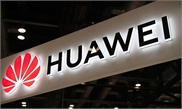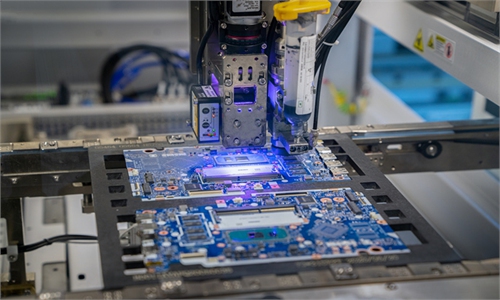Trump awaking Americans
https://vt.tiktok.com/
Containing China's tech devt, abusing 'natl security' will backfire: experts
Huawei defies US sanctions. Cartoon: Carlos Latuff
Despite US media revealing that the Pentagon is seeking an exemption from a 2019 Act that prohibits the US Department of Defense from contracting with entities that use Huawei equipment, Chinese analysts believe it's not a sign that the US will slow down its crackdown on China's technological development, but does show that the US' abuse of the "national security" concept has backfired, and that as Huawei continues to grow, the US will increasingly run into more self-imposed obstacles.
According to a Bloomberg report released on Wednesday local time, the Pentagon is provoking "a fresh showdown" with Congress, as it feels it cannot avoid doing business with Huawei, the world's largest telecommunications provider. Some US defense officials also warned of the risk of "national security being jeopardized" if the issue is not properly handled.
Section 889 of the 2019 National Defense Authorization Act, which went into effect on August 2020, prohibits US government agencies from buying or contracting with entities that use Huawei components.
Citing officials, Bloomberg claimed that the Pentagon believes Huawei is "so firmly entrenched" in the systems of countries where it does business that it makes finding alternatives almost a mission impossible, especially given that Huawei accounts for almost one-third of all telecommunications equipment revenue worldwide.
The Pentagon believes that if all the stipulated restrictions related to Huawei were met, it would also disrupt the Pentagon's ability to purchase the vast quantities of medical supplies, drugs, clothing and other types of logistical support the military relies on, Bloomberg reported.
Pentagon spokesman Jeff Jurgensen said extending the waiver would allow for purchases if they are deemed to further US national security interests. Senator Mark Warner, chairman of the Senate's intelligence committee, also admitted that a waiver may be necessary, according to the Bloomberg report.
Sun Chenghao, a fellow and head of the US-EU program at the Center for International Security and Strategy in Tsinghua University, told the Global Times that the Pentagon's reported appeal is more about a technical and business-specific issue, and shows very pragmatic thinking on supply chain and cooperation with other countries.
"It does not mean a shift in the US strategy of containing China," said Sun, "The US' attempt to crack down on Chinese technological development is unlikely to stop."
So far, the House and Senate committees in charge of the legislation have declined to include a waiver in the 2025 National Defense Authorization Act, according to Bloomberg. In addition, the Biden administration revoked eight licenses in 2024 that allowed some companies to ship goods to Huawei, Reuters reported on Tuesday.
"The Pentagon's attitudes show that the previous US bill is backfiring, as the US has encountered and has to deal with Huawei's irreplaceability, including Huawei's own technology, as well as Huawei technology integrated into other countries' products," said Lü Xiang, a research fellow from the Chinese Academy of Social Sciences.
If Washington continues its restrictions and containment, it will run into more self-imposed obstacles, Lü noted.
According to US media reports, four years after Congress ordered local network operators to remove telephone and internet equipment from Chinese companies, there is still much Huawei and ZTE equipment that has not been replaced, especially in rural areas. Only 12 percent of the companies in the Federal Communications Commission program have completed their work, while 40 percent of local network operators cannot complete the removal of Huawei and ZTE equipment due to a 3 billion funding shortfall.
If the "national security threat" claim holds water, isn't the US simply letting Huawei damage its "national security?" Lü asked, "By abusing the concept of national security, the US government has undermined the normal and just market competition."
"America's assassination attempt on Huawei is backfiring. The company is growing stronger and less vulnerable," The Economist said in a headline on June 13.
Huawei is indeed rebounding from the US' crackdown. According to Huawei's annual report released on March 29, the company's global sales revenue in 2023 was 704.2 billion yuan ($96.8 billion), and its net profit rose 144.4 percent year on year. On April 30, Huawei revealed that its profits had soared 564 percent in Q1 of 2024.
Huawei's growth despite US attempts to write it out of its own and Western allies' markets and industrial chain also shows that the US may be able to achieve some goals in the short term, but it is almost impossible to stifle the global tech giant in the world, Sun said.
Huawei's development shows the strong resilience of Chinese technology companies, Lü said, "by cracking down on Huawei and protecting its own companies, the US is actually encouraging local competitors to be lazy in innovation. As Huawei gradually makes real breakthroughs, the US goal of containing China's technological development will become increasingly difficult to achieve."
According to a Bloomberg report released on Wednesday local time, the Pentagon is provoking "a fresh showdown" with Congress, as it feels it cannot avoid doing business with Huawei, the world's largest telecommunications provider. Some US defense officials also warned of the risk of "national security being jeopardized" if the issue is not properly handled.
Section 889 of the 2019 National Defense Authorization Act, which went into effect on August 2020, prohibits US government agencies from buying or contracting with entities that use Huawei components.
Citing officials, Bloomberg claimed that the Pentagon believes Huawei is "so firmly entrenched" in the systems of countries where it does business that it makes finding alternatives almost a mission impossible, especially given that Huawei accounts for almost one-third of all telecommunications equipment revenue worldwide.
The Pentagon believes that if all the stipulated restrictions related to Huawei were met, it would also disrupt the Pentagon's ability to purchase the vast quantities of medical supplies, drugs, clothing and other types of logistical support the military relies on, Bloomberg reported.
Pentagon spokesman Jeff Jurgensen said extending the waiver would allow for purchases if they are deemed to further US national security interests. Senator Mark Warner, chairman of the Senate's intelligence committee, also admitted that a waiver may be necessary, according to the Bloomberg report.
Sun Chenghao, a fellow and head of the US-EU program at the Center for International Security and Strategy in Tsinghua University, told the Global Times that the Pentagon's reported appeal is more about a technical and business-specific issue, and shows very pragmatic thinking on supply chain and cooperation with other countries.
"It does not mean a shift in the US strategy of containing China," said Sun, "The US' attempt to crack down on Chinese technological development is unlikely to stop."
So far, the House and Senate committees in charge of the legislation have declined to include a waiver in the 2025 National Defense Authorization Act, according to Bloomberg. In addition, the Biden administration revoked eight licenses in 2024 that allowed some companies to ship goods to Huawei, Reuters reported on Tuesday.
"The Pentagon's attitudes show that the previous US bill is backfiring, as the US has encountered and has to deal with Huawei's irreplaceability, including Huawei's own technology, as well as Huawei technology integrated into other countries' products," said Lü Xiang, a research fellow from the Chinese Academy of Social Sciences.
If Washington continues its restrictions and containment, it will run into more self-imposed obstacles, Lü noted.
According to US media reports, four years after Congress ordered local network operators to remove telephone and internet equipment from Chinese companies, there is still much Huawei and ZTE equipment that has not been replaced, especially in rural areas. Only 12 percent of the companies in the Federal Communications Commission program have completed their work, while 40 percent of local network operators cannot complete the removal of Huawei and ZTE equipment due to a 3 billion funding shortfall.
If the "national security threat" claim holds water, isn't the US simply letting Huawei damage its "national security?" Lü asked, "By abusing the concept of national security, the US government has undermined the normal and just market competition."
"America's assassination attempt on Huawei is backfiring. The company is growing stronger and less vulnerable," The Economist said in a headline on June 13.
Huawei is indeed rebounding from the US' crackdown. According to Huawei's annual report released on March 29, the company's global sales revenue in 2023 was 704.2 billion yuan ($96.8 billion), and its net profit rose 144.4 percent year on year. On April 30, Huawei revealed that its profits had soared 564 percent in Q1 of 2024.
Huawei's growth despite US attempts to write it out of its own and Western allies' markets and industrial chain also shows that the US may be able to achieve some goals in the short term, but it is almost impossible to stifle the global tech giant in the world, Sun said.
Huawei's development shows the strong resilience of Chinese technology companies, Lü said, "by cracking down on Huawei and protecting its own companies, the US is actually encouraging local competitors to be lazy in innovation. As Huawei gradually makes real breakthroughs, the US goal of containing China's technological development will become increasingly difficult to achieve."
RELATED ARTICLES





No comments:
Post a Comment